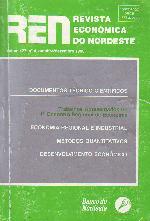COMPUTING OPTIMAL INDIRECT TAXES FOR BRAZIL
DOI:
https://doi.org/10.61673/ren.1996.2125Keywords:
Tax Revenue, Indirect Taxes, Brazil.Abstract
The regressive nature of the Brazilian tax system has long been a source of concern. The heavy reliance on indirect taxes as source of revenue is widely believed to be a major cause of the inequities of the system. In an attempt to deal with this problem, the 1988 Constitution established that the main Brazilian indirect tax (ICMS) could be selective according to the "essentiality" of the product. The moves towards a selective tax have been modest, however, and do not seem always to advance the objective of improving equity. This may be in part due to the vagueness of the "essentiality criterion" and to a lack of a better understanding of the consequences of selectivity for economic efficiency and government revenue. The purpose of this paper is to analyse the appropriate structure of indirect taxes for Brazil by using a computable optimal tax model. It attempts to characterize the indirect tax structure that would allow the Brazilian government to achieve certain redistributional objectives and raise enough revenue to finance its expenditure at the least possible cost in terms of efficiency.








